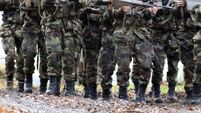Many EU nations in 'full war preparation mode', raising pressure on Irish neutrality

A French Leclerc battle tank firing during a Nato exercise at a training range in Smardan, eastern Romania. Defence Minister Simon Harris has been briefed that EU countries are now in 'full war preparation mode'. Picture: Vadim Ghirda/AP
Irish officials have told the Defence Minister, Tánaiste Simon Harris, that many of Ireland’s EU partners are in “full war preparation mode”.
A high-level briefing document for the new minister said European defence was increasingly seen as “vital” to the EU’s very security.













